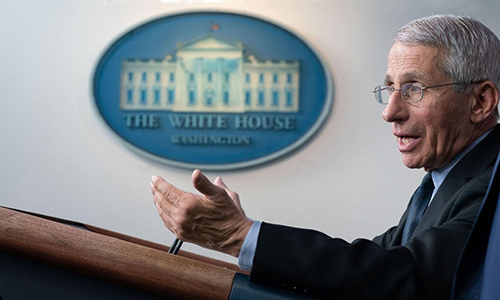Dr. Anthony Fauci is an American physician and immunologist who has served as the director of the National Institute of Allergy and Infectious Diseases (NIAID) since 1984. As a physician with the National Institutes of Health (NIH), Dr. Fauci has served American public health in various capacities for over 50 years, and has been an advisor to every U.S. president since Ronald Reagan. Since January 2020, he has been one of the lead members of the Trump Administration’s White House Coronavirus Task Force addressing the COVID-19 pandemic in the United States.
Omnilert: What advice can you give to organizations and institutions trying to simplify the complex and communicate effectively with their stakeholders?
Dr. Anthony Fauci: To be an effective communicator, you must be honest, responsive, and always act with integrity. You must regularly share information that is important for your audiences to know but in doing so, be transparent about successes as well as difficulties and failures. Know your audience; tailor your language and messages to the specific audience you are communicating with and consider how much they likely already know and what they need to know or may be interested to learn. Your overarching goal is to effectively communicate and increase understanding, not to try to impress anyone. Show empathy, recognize people’s fears, and as appropriate, offer reassurance. However, do not paint too rosy a picture of a difficult situation or be afraid you may lose your standing as an expert by saying you do not know the answer. Especially during an emerging situation, such as a pandemic, much is unknown early on, and admitting you do not know something can increase the perception that you are a source of information who can be trusted. Hyperbole, condescension, speculation, or hiding information can all engender mistrust and harm your credibility. It is much more difficult to regain credibility once you have said or done something to lose it, and if you lose credibility, people tend to stop listening to or become skeptical of what you have to say.
Omnilert: How can organizations and institutions align pandemic communication strategies with trends in how people currently access and utilize health information?
Dr. Anthony Fauci: People access and utilize health information in a variety of ways today. To reach the broadest segment of the population, it is important to disseminate information about the pandemic through multiple communications platforms. These include traditional ways of disseminating information, i.e., through engaging print, radio, and TV outlets, issuing press releases, holding press conferences, and participating in media interviews. Increasingly, however, people access health information through new and social media platforms, for example, Facebook, Twitter, Instagram, YouTube, WhatsApp, blogs and podcasts. To have your message reach the broad public of diverse audiences, it is critically important to have a presence on and participate in the conversations going on in an array of new and social media outlets such as these.
Click here to read the full Pandemic Communications Interview with Dr. Anthony Fauci














